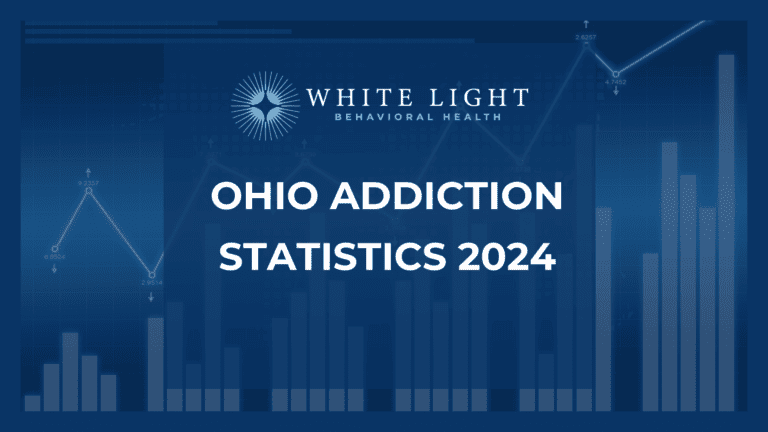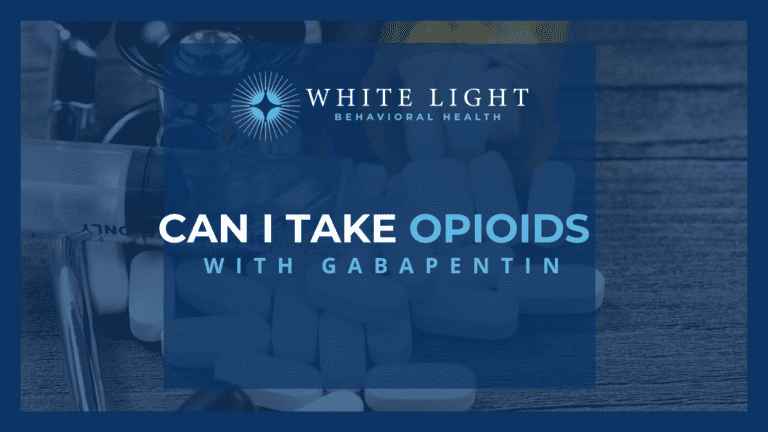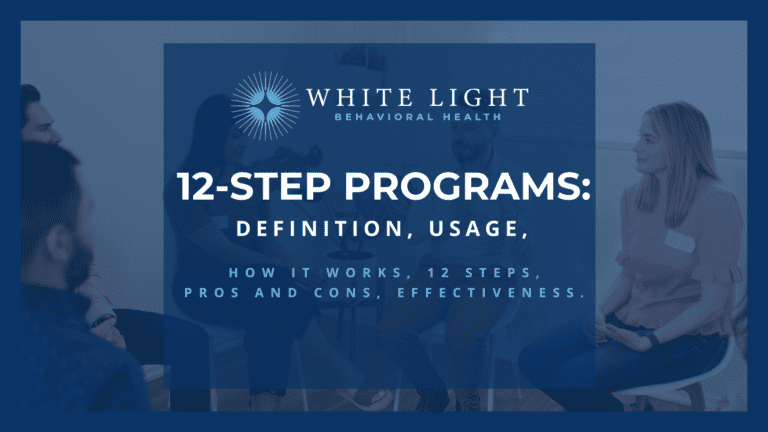
At White Light Behavioral Health in Columbus, Ohio, we recognize the uphill battle many face with opioid addiction, a challenge underscored by the staggering statistics that highlight the opioid crisis’s severity. Our program is meticulously designed to address this epidemic head-on, offering more than just detoxification; we provide a robust rehabilitation framework aimed at fostering enduring sobriety.
Following the critical detox phase, which is essential for managing withdrawal symptoms safely, our clients transition into a comprehensive rehabilitation program. This program is the cornerstone of our approach, where the focus is on equipping individuals with the necessary tools and skills for long-term recovery. Statistically, individuals who engage in extended rehabilitation programs post-detox are significantly more likely to maintain sobriety. We incorporate evidence-based practices to ensure our clients are among these success stories.
Choosing White Light Behavioral Health means opting for a path supported by data and compassion, a path that recognizes the importance of comprehensive care in overcoming opioid addiction. With our support, clients are not just numbers in the opioid epidemic; they are individuals on a journey to recovery, each step backed by a program that values their long-term well-being and success.
Who Needs Opioid Detox And Rehab?
The opioid detox and rehab programs at White Light are tailored for individuals struggling with opioid addiction, ranging from prescription painkiller dependence to challenges with heroin or synthetic opioids. This program is a crucial step for:
- Individuals experiencing withdrawal symptoms indicative of physical dependence.
- Those who have attempted to quit opioids on their own but were unsuccessful.
- Anyone motivated to embark on the journey toward an opioid-free life.
Signs indicating the need for opioid detox include:
- Increasing tolerance to opioids requires more of the substance to achieve the same effects.
- Experiencing withdrawal symptoms when not using opioids, such as nausea, muscle aches, anxiety, and insomnia.
- Prioritizing opioid use over personal, professional, and family responsibilities.
- Continued opioid use despite the negative consequences on health, relationships, and overall well-being.
- Engaging in risky behaviors to obtain opioids, such as doctor shopping or using illegal sources.
- A desire to stop using opioids but being unable to do so due to intense cravings or fear of withdrawal.
Our program offers a supportive and structured pathway to recovery, addressing both the physical and psychological aspects of opioid addiction.
Opioid Detox And Rehab Programs at White Light in Columbus, Ohio

- At White Light Behavioral Health, we specialize in a comprehensive suite of opioid detox services tailored to address the complexities of addiction and support the individual paths to recovery. Our personalized care approach is grounded in understanding the unique circumstances of each client, ensuring the most effective treatment strategies are employed. Among our specialized detox and rehab programs, we offer:
- Heroin Detox: A program designed to safely manage the withdrawal symptoms associated with heroin use, providing both medical and psychological support to ease the transition towards recovery.
- Fentanyl Detox: Recognizing the heightened potency and risk associated with fentanyl, our detox process includes specialized care to address the intense withdrawal effects safely and effectively.
- Suboxone Detox: Aimed at individuals looking to taper off Suboxone as part of their treatment plan, this program focuses on minimizing withdrawal symptoms while supporting overall recovery.
Rehab Programs For Opioid Addiction In Columbus, Ohio
- Medical Detoxification: Offers a foundation for recovery with evidence-based protocols for easing withdrawal symptoms under constant medical supervision.
- Residential Rehab: Provides a structured, supportive environment for intensive care during the initial recovery stages, including both medical and therapeutic support.
- Partial Hospitalization Program (PHP): Bridges the gap between residential treatment and outpatient care, offering a high level of support while allowing clients to begin integrating into their daily lives.
- Intensive Outpatient Program (IOP): Supports clients in further stabilizing their recovery with flexible yet comprehensive care, ideal for those transitioning towards more independence.
- Outpatient Programs: Facilitates continued recovery and relapse prevention through ongoing therapy and support, tailored to fit into the client’s daily life and commitments.

How Opioid Addiction Begins
Tolerance, dependence, and addiction are swift and unfortunate consequences of misusing opioids, even when prescribed by your doctor. Of course, multiple factors lead individuals into such an addiction. But no one can predict or even guess who might suffer such an addiction or who can walk away from these drugs unscathed. Sadly, opioids take more lives than any other drug in the United States.
Opioid addiction starts with euphoria and other pleasurable feelings from the drug. But soon and with continued use, these feelings become something you need to function normally in daily life. Cravings quickly begin as your body and mind want more of the drug with each passing day. At this point, you keep using your painkillers despite knowing they are also causing you harm. You ignore the consequences of doing so because your compulsion to use is so intense. That is how opioid addiction begins, in a nutshell.
What you may not realize in the earliest days of your opioid use disorder is that the drugs change your brain chemistry and structure. Each dose triggers the reward centers in your brain and brings on a surge of endorphins. This makes you feel the effects you crave.
Opioid Withdrawal
As your drug’s high wears off, you lose the positive feelings of well-being. The only way you feel good again is by taking another dose. Besides intense cravings, you suffer depression, lost interest in daily activities, and anxiety when you are not high. If you wait too long for your next dose, you start to feel a wide range of withdrawal symptoms.
- Agitation
- Anxiety
- Muscle
- Insomnia
- Runny
- Sweating
- Yawning
- Abdominal
- Dilated pupils
- Goosebumps
- Nausea and vomiting
Opioid withdrawal symptoms include:
Seeking help can save your life, particularly since many people starting withdrawal alone suffer a life-threatening relapse before fully detoxing. If you have friends who also abuse these drugs, you may have one or two who have experienced an overdose just after they pledged their desire to get clean.
The Opioid Detox Process at White Light
Beginning the opioid detox process at White Light Behavioral Health is a crucial step toward reclaiming control over one’s life. This journey starts with a comprehensive evaluation to tailor the detox plan to the client’s specific situation, considering factors such as the duration and intensity of opioid use and any existing mental health conditions. Our experienced medical team closely monitors clients throughout detox, providing medications when appropriate to reduce withdrawal symptoms and ensure a safer, more comfortable process. The compassionate care and support extended by our staff throughout detox embody our commitment to each client’s well-being and success in recovery.

Locating White Light Behavioral Health In Ohio
Situated in Ohio, White Light Behavioral Health is easily accessible to individuals seeking assistance with opioid withdrawal. Our facility offers a serene environment conducive to recovery, away from the triggers and pressures of everyday life.
Take the First Step Toward A Life Free From Opioids
The decision to seek help for opioid addiction is a significant, life-changing step. At White Light Behavioral Health, we are ready to guide you through the detox and rehab process and support your transition into a life free from opioid dependence. If you or someone you love is struggling with opioid addiction, we encourage you to reach out to us. Learn more about our treatment programs and how we can help you or your loved one start on the path to recovery and healing.

Frequently Asked Questions About Opioid Detox In Ohio
How long does opioid detox take?
The duration of opioid detox varies based on factors like the type of opioid used, the length of use, and the individual’s physical health. Generally, the acute phase of withdrawal lasts from a few days to a week. Our medical team provides a personalized assessment to offer a clearer timeline for each client.
What happens after detox?
Detox is the foundational first step in recovery. After completing detox, continuing treatment through therapy, counseling, and support groups is crucial for addressing the psychological aspects of addiction and sustaining sobriety.
Does White Light accept insurance for detox services?
Yes, White Light works with many insurance providers to cover the cost of detox and treatment services. Our admissions team can assist with insurance verification and exploring your coverage options.
Can family members be involved in the treatment process?
Family involvement is encouraged and can be pivotal in the recovery process. White Light offers opportunities for family participation in therapy and educational programs, aiming to repair relationships and build a strong support network for the client.



